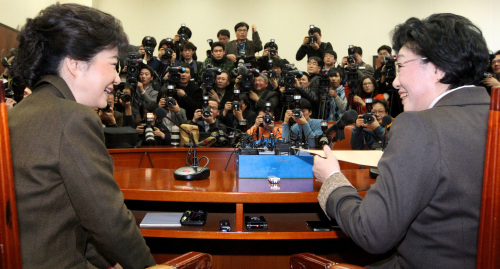Leaders agree on revision of laws to allow open primaries ahead of elections
Rival political parties, preparing for a crucial parliamentary election in April, are competing to look more radical in reforming the way they nominate candidates.
With polls pointing to widespread voter disillusionment and an anti-incumbent mood, leaders of both parties feel that their fate in the upcoming election hinges on whether they succeed in fielding competitive candidates through an open and transparent process.
Korea’s political parties have long been criticized for the opaque way they have selected candidates, which often involved corruption and closed-door deals.
“Reform of the candidate-nomination process is the very core of our efforts to remake the party,” Rep. Park Geun-hye, chairwoman of the ruling Grand National Party, said during a general gathering of the party’s lawmakers on Tuesday.
Rival political parties, preparing for a crucial parliamentary election in April, are competing to look more radical in reforming the way they nominate candidates.
With polls pointing to widespread voter disillusionment and an anti-incumbent mood, leaders of both parties feel that their fate in the upcoming election hinges on whether they succeed in fielding competitive candidates through an open and transparent process.
Korea’s political parties have long been criticized for the opaque way they have selected candidates, which often involved corruption and closed-door deals.
“Reform of the candidate-nomination process is the very core of our efforts to remake the party,” Rep. Park Geun-hye, chairwoman of the ruling Grand National Party, said during a general gathering of the party’s lawmakers on Tuesday.

Earlier in the day, Park agreed with her opposition counterpart Han Myeong-sook to cooperate to revise election laws to allow parties to select candidates through an open primary in the forthcoming election.
“For the local politics to advance, we thought, the public should be able to participate in a political party’s selection of candidates. So we decided to introduce an open primary system,” Park said.
Han, the newly elected chairwoman of the main opposition Democratic United Party, also stated the need for the amendment of related rules.
“I believe a revolutionary change will take place in the way parties nominate candidates, because of the overwhelming public demand to allow their participation in the process,” she said.
Both parties plan to select candidates through the system, although details are yet to be finalized.
As for the GNP, which unveiled a draft of its new guidelines Monday, some 80 percent of its candidates are to be selected through the open contest.
Under its plan, a quarter of its incumbent lawmakers will be stripped of their chance to compete for the party’s ticket. The party will grade all incumbent lawmakers who wish to run for re-election based on their legislative performance and approval ratings and exclude the bottom 25 percent from its list of possible candidates.
The conservative party plans to launch a candidate-screening committee, headed by an outside figure, after the Lunar New Year holidays.
The DUP, which just formed a new leadership, is speeding up efforts to draft its own plan. Han, not to be outdone by Park, is likely to come up with more radical measures.
During the leadership race, she had pledged a revolutionary change in the way the party nominates its candidates, saying she will return to the public the power to put up candidates.
By Lee Sun-young (milaya@heraldcorp.com)
-
Articles by Korea Herald




















